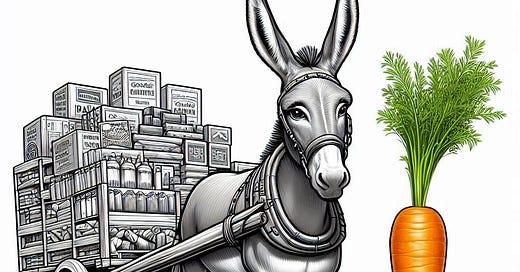Matt Yglesias makes a good point about incentives facing foreign firms in China and how that has influenced Chinese industrialization.
The policy implication of this is the need to carefully align incentives with national objectives.
In 2001 the US created a huge incentive to make importing stuff cheaper and make exporting stuff more expensive. It was initially the GWB tax cuts and deficits, followed up with a big expansion of Medicare without an increase in taxes to pay for that expansion. Trump followed up with the “Tax Cuts for the Rich and Deficits Act of 2017.”
And not to be overly partisan about this, Democrats did not then and have not since made restoration of the Clinton fiscal surpluses any part of their agenda.
This was a huge mistake. Deficits in practice, the specific combination of tac cuts and expenditures, shift resources from investment to consumption and reduce growth. It was a _worse_ mistake if making stuff that can be imported and exported is more valuable for some reason (including keeping Midwestern Democratic voters from jumping ship) than other ways of creating wealth. [But if that is the case, so too has been the entire US trade agreement strategies which has put far more effort into getting our trading partners to pay US firms for trademarks and copyrights and agricultural exports, than to reduce barriers to US exports of manufactured goods.]
This leaves out if making specific goods that can be imported and exported (highest tech computer chips? EV's? military hardware) is more valuable that other stuff that can be imported and exported. _That_ would suggest subsidies to the production of -- NOT investment in the production of --- those things, regardless of whether they will be sold domestically or exported. [It would also suggest that any regulatory restraints or social obligations imposed on these activities be very strictly vetted to ensure that that they do not impose more costs than benefits, certainly not the opposite.] But these subsidies, like any other expenditure, shift fewer resources from investment to consumption if they are paid for with taxes, especially if they are taxes on consumption. It goes without saying that the subsidies should not be greater than the "excess value" of the production of those specific goods have over other goods
Both of these leave out if importing specific items from hostile countries is more of a security threat than other imports. This would call for tariffs on imports of those goods from those countries to the degree of the cost of interruption of supply and the likelihood of that interruption. threat. Concomitantly, restrictions on imports of those goods from not hostile countries should be reduced
Finally, if the objective is to reduce the negative externality some specific activity, say net emissions of CO2 and methane, the proper incentive is a tax on that activity at a level estimated to achieve the optimal level of that activity.
As conservatives used to say, "incentives matter." Progressive should begin saying and acting on it.
[Standard bleg: Although my style is know-it-all-ism, I do sometime entertain the thought that, here and there, I might be mistaken on some minor detail. I would welcome comments on these views.]





Respectfully, I find Matt yglesias to be a tit who talks more than he listens, is unlikely to know where his food comes from, and knows little about science, or the natural environment. I won't get over a billion people in the US. Welcome water shortages! Woohoo.
I hope you don't hold this against me Thomas. 🙏